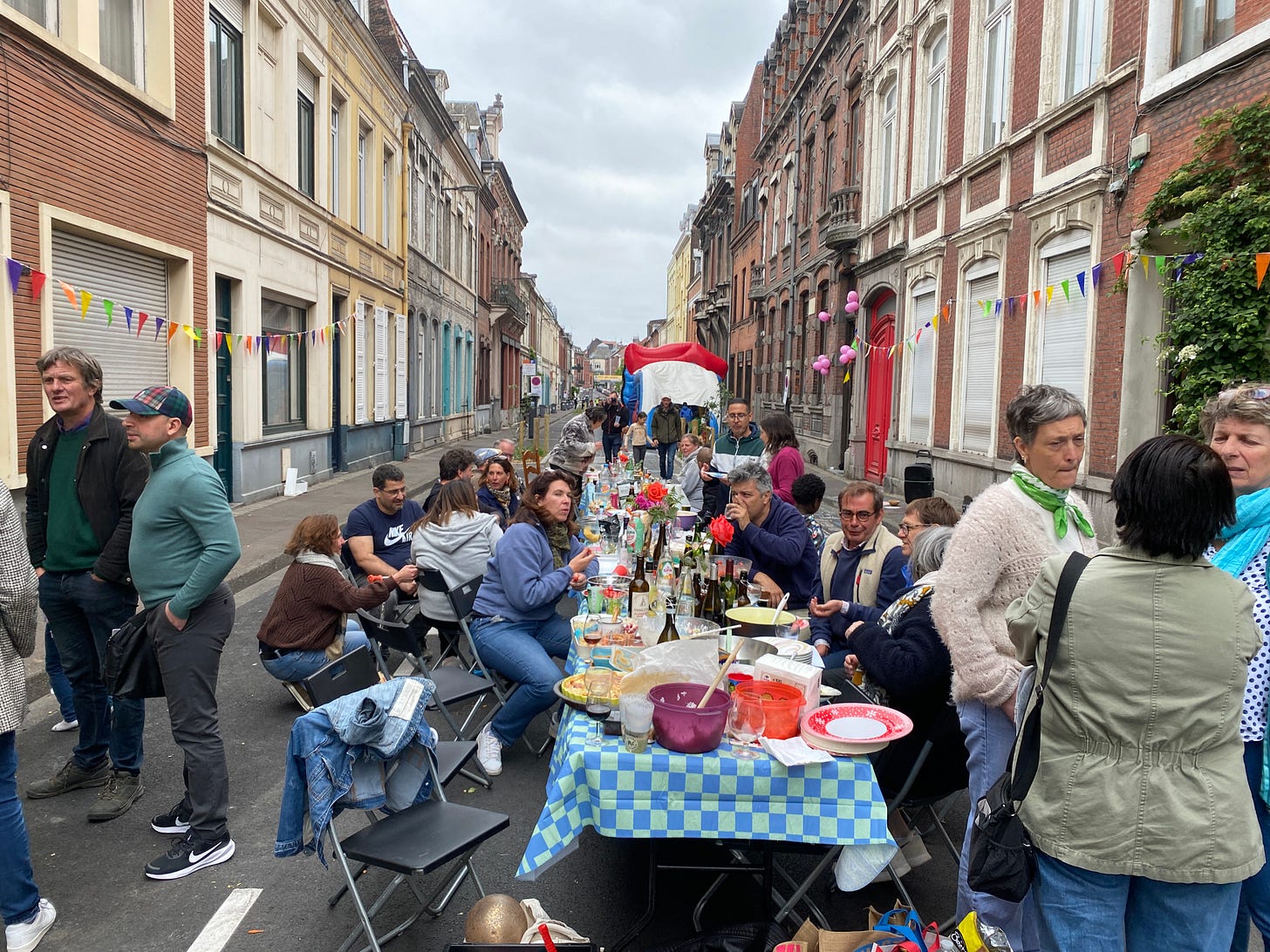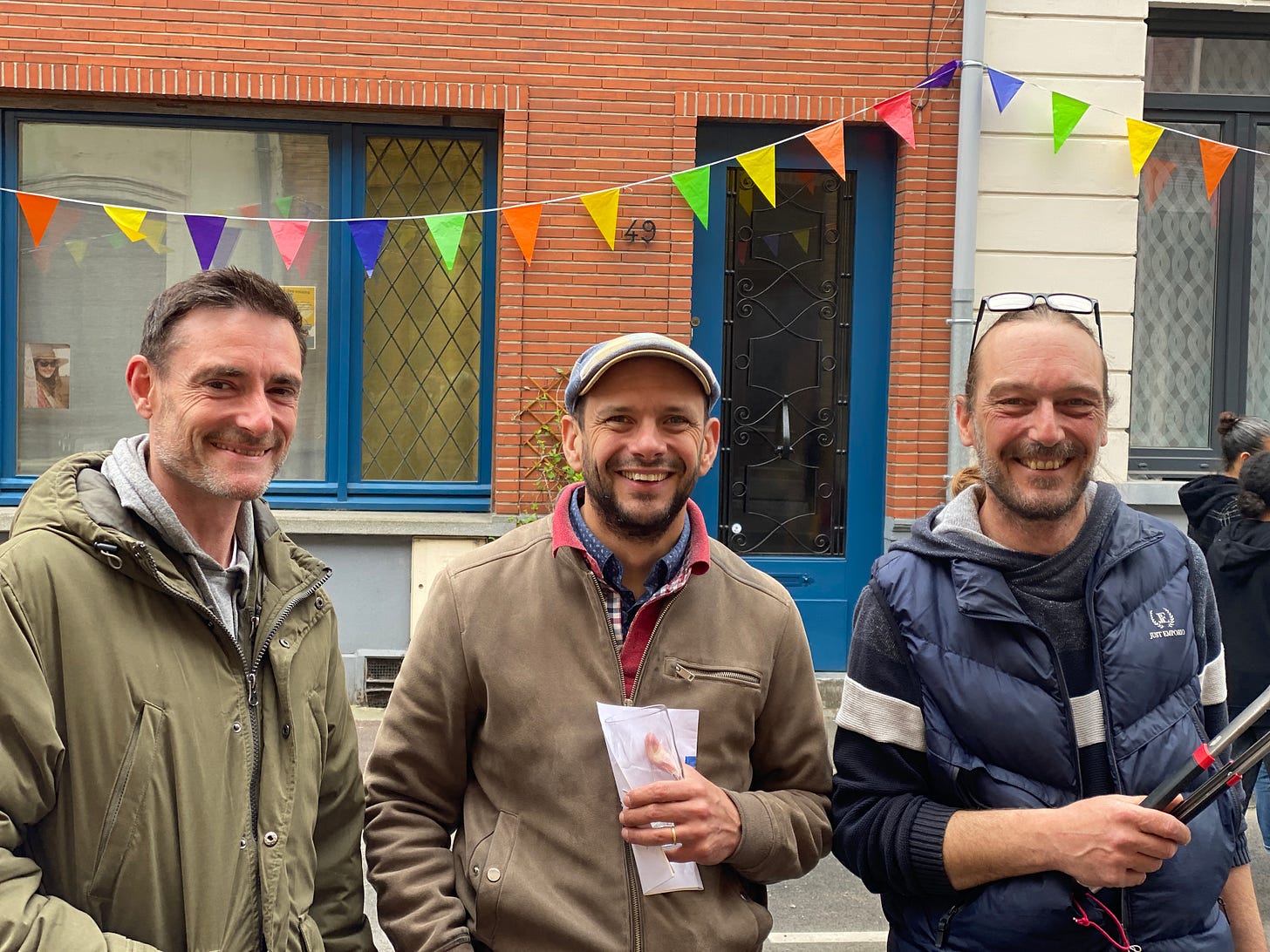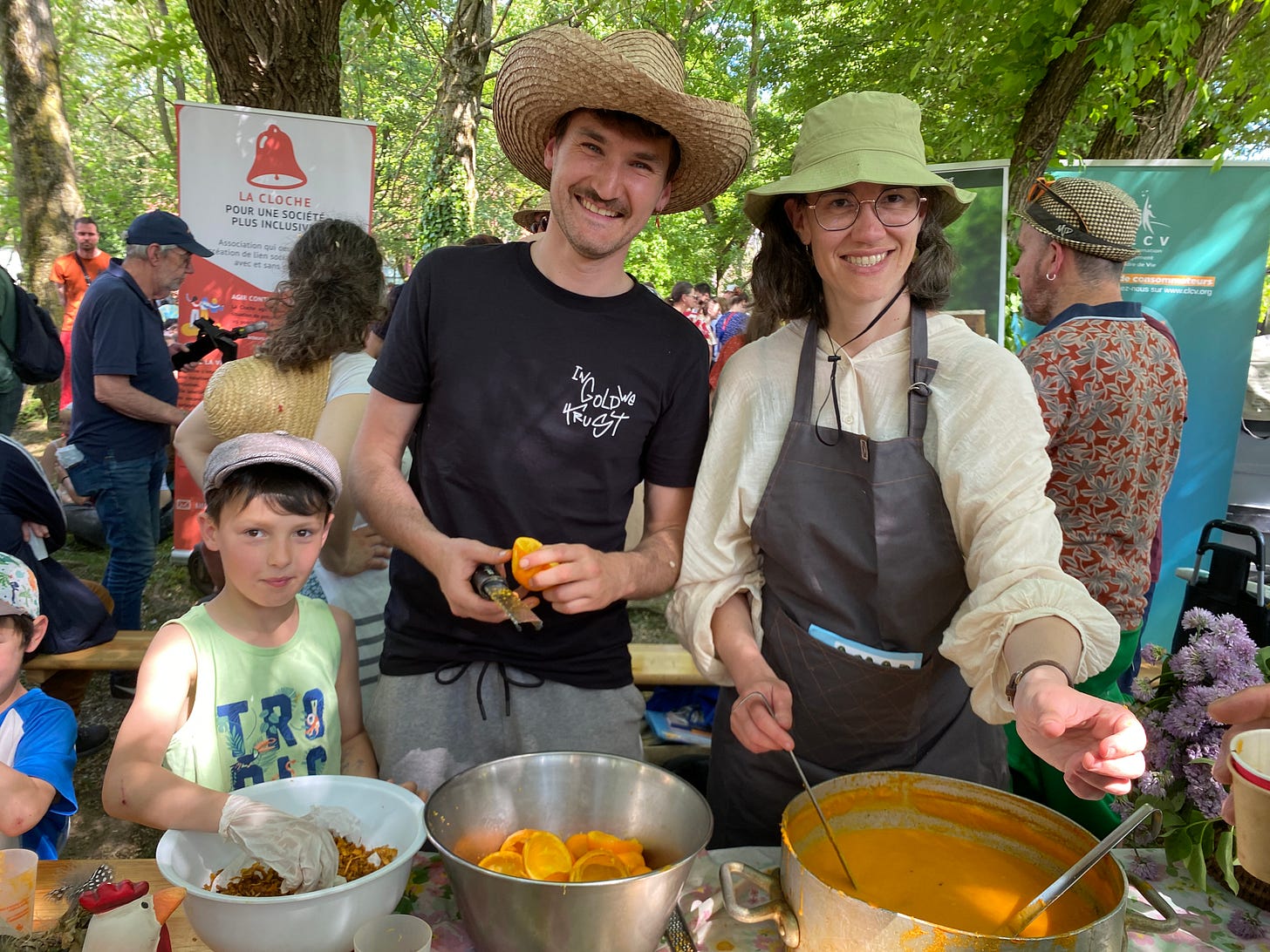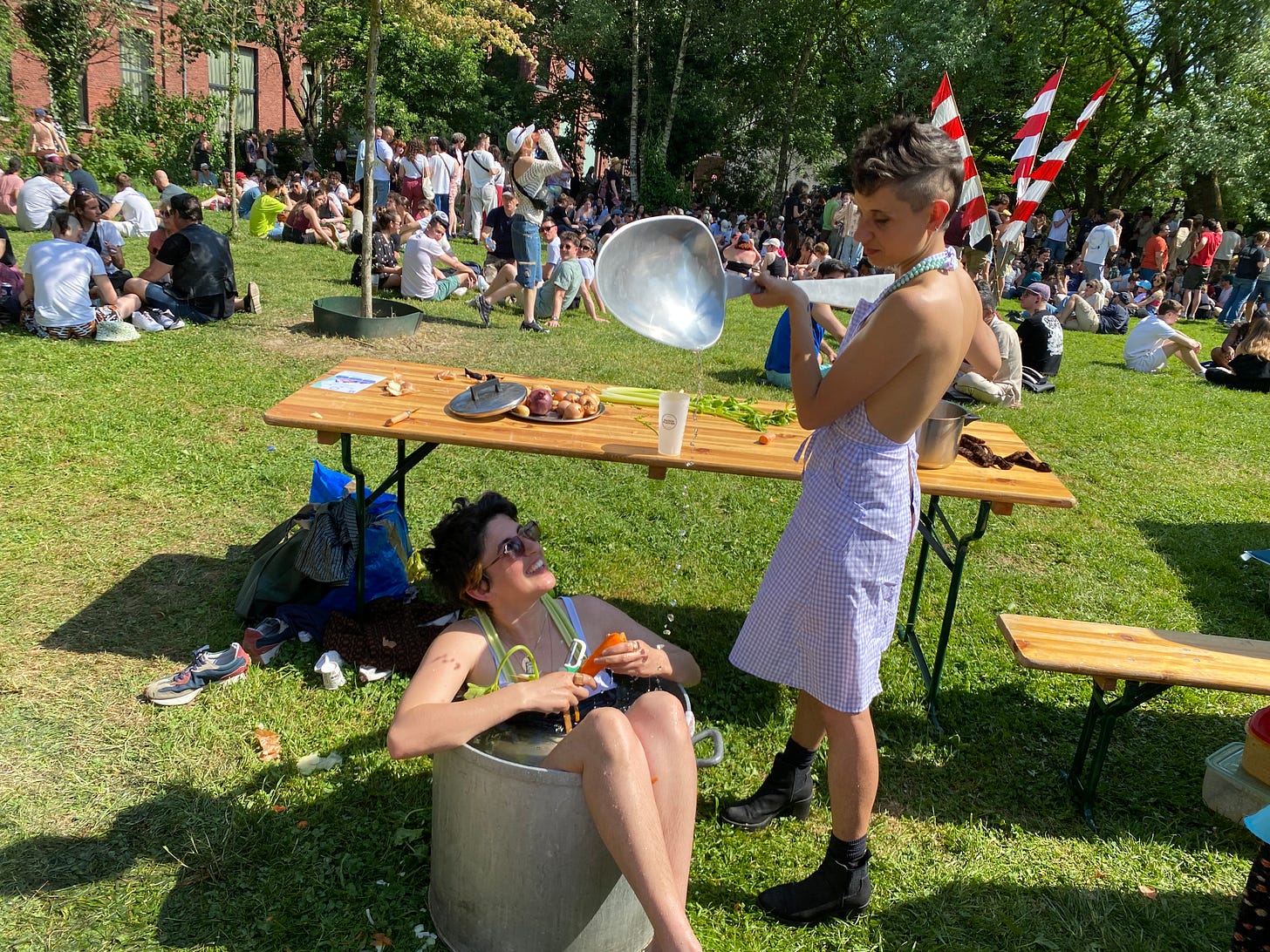The Missing Gesture
How (Not) Sharing Meals Reveals France's Invisible Walls
This Sunday afternoon. The normally inconspicuous Rue Inkerman is closed to traffic. Neighbors have laid out tables, which quickly got filled with food. It’s the Fête des Voisins - neighbor’s party, organized for no reason except simply feeling like it.
The three of us show up and we feel instantly welcome. “Vous abitez ici?” The question was a formality. “No, we don’t live on your street, we’re two blocks away, but we’ve brought wine and rice dish, how about that?”
Our answer lands perfectly. We quickly meet the tribe, spend hours talking, then end up in people’s gardens for afterparty. If you ever live in France, go to the nearest Fête des Voisins as soon as you can!
Is France like that?
No. I did not want to scare you up-front.
Now, let’s move on to some true horror stories.
Three horror stories
At a certain Summer music festival, I walk to my tent with a beer and a pack of chips in hand. A couple has pitched a tent near mine. I approach to welcome them and, while saying bonjour, I casually offer them some chips.
They look bewildered, as if I am an alien. They literally freeze. I feel bad! I forgot again. You don’t do that in France. You don’t casually offer food to strangers. After a few days, when we’ve known each other - maybe. Or, at the very least, after some small talk. But never upfront, like that. If you do, it makes people quite uncomfortable.
Fast forward two months. I am in Marseille, looking to rent a room. I am invited for a viewing of a shared house, at lunchtime. When I arrive, the tenant, a girl about 35, invites me to sit at an empty table. While we discuss, she finishes preparing soup. Then she pours the soup into one bowl, which she places in front of her. She sits and starts eating - while continuing talking to me. I sit across from her, not offered anything. She then tells me to look around the house while she keeps eating.
Feeling strange and unwelcome, I later asked a local friend whether she was rude. He asked me simply: “What was the purpose of the visit?” I responded: “A room viewing”, I replied.
“Then this is quite normal. You were not invited to eat - why would you expect to?” I admit my friend’s response was logical. Still, I felt awkward invited to someone’s home during lunchtime and watching them eat, but not being part of it.
Fast forward a year… in the sports club that I attend, a woman asks everyone for help moving her furniture. I show up, alongside another person who also volunteered. The girl walks out to greet us, with a tea mug in her hand. “What a kind gesture” I thought naively, knowing how I am quite naturally offered a welcome tea or coffee when visiting homes in UK, or Germany, or Poland. She approaches me and we exchange the customary double kiss, but that’s all. The tea is not being offered. The mug is hers. While continuing sipping her tea, she instructs us what to carry out of the house, which we do. We are not offered any tea. “She’s not rude… it’s France. Remember the purpose of the visit. We did not come for tea. We came for moving the furniture” - my logical brain is desperately persuading me to not explode, which I am close to. What finally helps me calm down is the thought that she reminds me of someone: Michael Scott with his mug, convinced he’s World’s Best Boss. So I start laughing. Except here, we’re not paid employees - we’re just acquaintances who came pour donner un coup de main (to lend a helping hand).
Alien Norms in a Nuanced Society
Of all the countries I’ve lived in, France appears the most sophisticated. Viewed from outside a pillar of European identity, in many respects French are, in reality, alien here, with some of their social norms baffling or even appalling. I long hesitated writing about France, fearing I didn’t understand enough. Now, after several years here, I am giving a try - although many things remain obscure.
In the previous story I wrote about the nuances of introducing yourself. Here, I focus on a near-universal human gesture of offering food to a stranger.
How universal?
Buddha accepted rice milk from Sujata after asceticism. In homeric epics, xenia (guest-friendship) involved sharing meals, and those who did not obey were punished by gods. On the road to Emmaus, Luke and Cleopas recognized the risen Jesus by his famous gesture of breaking bread. Centuries later, Muhammad said: “He is not a believer whose stomach is filled while the neighbor goes hungry.”
In many cultures, breaking bread is sacred, because sharing food means sharing life. It’s often the bridge between divine and human, the rich and poor, or the host and stranger. In religion, the act has become sacramental (Christian Eucharist), communal (Islamic Iftar), or symbolic of harmony with nature (Indigenous traditions). In Poland, a common proverb goes: “Gość w dom, Bóg w dom” - “Guest at home - God at home”.
In the countries I went, offering food to a guest, or a stranger, is symbol of peace, trust, friendship, God’s blessing.
France is an exception. Here, I’ve seen this gesture missing in contexts where it would be automatic elsewhere. (I have not been everywhere though - if you have similar observations from some other countries, please share in the comment).
The Samaritan moment
I have always lived in shared houses in France. One day, I was cooking dinner in the communal kitchen when a flatmate walked in with a visiting friend. With my eyes still focused on the cutting board, I casually asked the stranger “Tu manges avec nous?” [Will you be eating with us?] What developed then was a truly biblical scene. When I turned my head and looked in his eyes, I felt like Jesus asking the confused Samaritan girl for water at Jacob’s well.
The Samaritan woman said to him, “You are a Jew and I am a Samaritan woman. How can you ask me for a drink?”
In the frightened eyes of the man I saw something similar: “Why is this man, unknown to me, offering me food which he bought for his own money? Is this a trap?” My flatmate quickly stepped in and resolved the tension. She turned to the confused man to explain: “Pablo, Il partage tout” [Pablo shares everything] She had to clarify that I was a bit eccentric - so he didn’t think I was an idiot.
And yes, in many (not all) shared homes in France I was considered odd, for being way too generous with food - while in similar settings abroad, I blended in quite easily.
The Generous Side of France
I sometimes wonder how France ended up like this. Don’t the French travel? Spontaneous food sharing is common in Spain, Italy, Poland, or Germany - and also in former French overseas territories.
Of course, we (the “other” Europeans) don’t do it in every situation: you don’t offer casually food to strangers on the street. But in many cases—such as a guest arriving at lunchtime—a meal would be offered. Even if declined, the gesture would be made.
In France, it is quite different. Not because the French aren’t generous—but because their generosity is highly context-dependent.
So let’s name some of those contexts.
#1: Explicit invitation
Straightforward. If you’re invited to a dinner, you’ll be offered food.
#2: Hanging out with the rebels
In numerous community centers run by militant social activists, the first question might be: “Do you want soup?” These groups openly resist bourgeois social norms. Sharing food becomes a statement—often cooked from ingredients recovered from supermarket bins.
One famous outpost of this rebel thinking is the association Les Restos du Cœur started in 1985 by Coluche, famous comedian and political activist. In 2024, the association distributed 163 million meals to 1.3 million of persons by an estimated 66,000 voluntaries.
#3: Begging
I’ve observed that those who humbly approach people on the street often receive something — whether it’s change or food. It shows that the French are, in fact, quite generous. In my personal impression, more generous than other nations - in this particular context. Because in France, context changes everything: you might not be offered food inside someone’s home, but if you beg outside their door, your chances grow. One of those French paradoxes.
Notably, the French SDF (sans domicile fixe — the homeless) are polite. By comparison, in Senegal, children just look at you defiantly and command: “Money.” In the Balkans, gypsy kids simply glare and hold out their hands. By contrast, in Lille Flandres metro station, clochards address you humbly and eloquently, in full sentences and even paragraphs.
#4: Auberge Espangol
This "Spanish inn"–style party is where everyone brings something to a shared table. In other countries, this happens naturally. In France, it needs a name—implying its foreignness.
#5: Fête des Voisins
Back to where we started. This neighborly celebration often includes auberge espagnole-style food sharing. Just show up with wine or salad—and forks, and corksrew, just in case. Must-go, if you move in to a French town!
Fête des Voisins often go by different names. A beautiful festival of sharing happens every May in Lille: Fête de la Soupe. Anyone can bring a pot of soup and offer it to strangers. This unfolds into colorful carnival. Because whenever the context allows, the French love to dress up and act crazy. My favourite stand was a soup made of a human (bottommost picture below).
Surprisingly, when it comes to sharing food, French are, in fact, generous - but this must be framed in a particular social context. More often than not, this leads to mishaps when the French customs clash with foreign cultures.
The unfortunate ending
One day in a Senegal village, I had no small change to buy beignets (deep fried doughnuts) on a street stall. A local girl, whom I didn’t know, paid for me. I returned the next day to repay her and offered cookies to those nearby.
The Senegalese react spontanously. I received big applause! Some teenagers were even yelling from joy. But the scale of this was disproportional to what just happened. I asked why. A smiling girl said: “On a jamais vu un blanc qui fait ça. Un blanc qui partages le repas avec des noirs¨ [We have never seen a white man to share food with the blacks].
I was shocked and deeply saddened. Is it possible that none of European travellers ever afforded the gesture of breaking bread? I understood better a few days later, having met some of the white expats of the area. All of them were French.
*** *** ***
In my experience, French culture doesn’t lack generosity—it emphasizes ritual and boundaries. Sharing food isn’t absent, but it's ritually controlled, which means it can happen only in certain context. Unfortunately, these strict codes can cause cultural misunderstandings—abroad, and at home.
Sadly, I later heard in Senegal more than once:
Tous les blancs qu’on connaît sont méchants
[All the whites whom we know are unkind]
Post Scriptum
You may also like…








I had never thought that much about this as I'm not deeply familiar with a lot of cultures, but I think you're right that sharing food doesn't happen that easily here. I believe this is partly because meals are such a very big deal that people don't feel comfortable just handing someone a hunk of bread in their house. You're there for a specific food-related reason (including apéro of course, or goûter/tea, besides lunch and dinner) or you're not there to eat, although I have found people fairly quick to offer a coffee or something else to drink, even just a glass of water, if I'm just dropping by.
But of your three "horror stories," I only find the first example typically French. True, you generally don't initiate contact with people here by handing them your bag of chips.
For the soup story, I'm not so surprised the French person didn't offer you soup too, which would have put her under "meal pressure" -- and maybe she had no more soup! But I am surprised she ate in front of you at all. Did she not at least say "I'm sorry to have to eat in front of you but I'm in a rush to get back to work" or some such? I find that a bit odd and the whole thing not exactly typically French.
And I'm really surprised at the woman who enlisted help in her move and couldn't even manage to serve you all tea or at least something, and I think that is rude even by French standards. I believe French etiquette would dictate that she have drinks and snacks available to you, even just stuff from the supermarket. This incident doesn't sound typically French to me at all. But then again I find your reactions from locals a bit odd too, especially on the third incident. We've had people help with two moves and I somehow managed to feed them a meal despite the chaos of moving, which I remember feeling a bit annoyed about but my (French) husband felt it suitable and looking back, I think he was right.
How strange. Having lived in Calcutta and nyc for most of my life with a stint in rural uk for a year I am now in Paris in what I hope is my last big move. I actually find the people here (granted I’m not usually hanging out with a white French person but people from all over) are as warm as Indians who are amongst the most hospitable people. Well Arabs too I find this openness but Paris feels home much faster than most other places did .